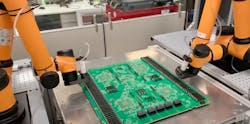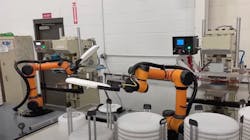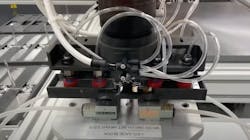Applications for 3D printing/additive manufacturing has grown by leaps and bounds over the past decade—particularly for its use to produce production- and assembly-ready parts, not just prototypes. But as Zach Gray with Siemens Additive Manufacturing notes, 3D printing “will not replace all traditional types of manufacturing. The value of additive manufacturing (AM) applications depends on the use case,” he said. “The economics of AM are particularly suitable for products manufactured in individualized mass production or when single parts or small series are needed.”
This is a key niche for 3D printing—producing parts that are difficult and/or expensive to make with traditional manufacturing processes. And that’s behind Rapid Robotics’ use of Markforged 3D printers to produce custom grippers for its robots based on the end user’s application.
Another key factor that led Rapid Robotics, which provides robots-as-a-service to small and medium-sized manufacturers, to 3D print its end of arm tools is the diversity of its customer base. The company’s customers produce a variety of products, ranging from frisbees and PCR chips for COVID tests to printed circuit boards, medical devices and automotive parts.
“No two deployments are the same for us and every robot is fully customized,” says Kretchmer. “We need Markforged to get our robots to fit to any solution possible.”
Onyx is Markforged’s principal composite base material made of a micro carbon fiber filled nylon. Markforged says Onyx “yields accurate parts with near flawless surface finish” adding that more than a million Onyx parts are in use in manufacturing today.
“We've been deploying robots with grippers that were printed on Markforged printers since day one and we have never had a gripper break in the field,” notes Kretchmer.
Rapid Robotics has 10 Markforged 3D printers in its San Francisco location and 15 in its Detroit office. Kretchmer says Rapid Robotics can create a new gripper within 12 hours that is “a perfect fit that's going to be highly reliable and also weighs about 30% of the total weight of an off-the-shelf gripper.”




